The Laird of Tomintoul: £5m police fraudster who lorded over village
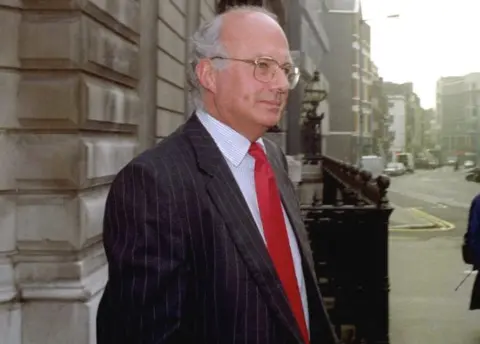 PA Archive
PA ArchiveWhen a stranger arrived in the picturesque Scottish village of Tomintoul in the 1980s, he started investing millions.
Calling himself Lord Williams, he bought local businesses and property, and became a popular local figure.
But all was not what it seemed.
Anthony Williams had embezzled more than £5m from the Metropolitan Police, his title was bought, and he was jailed when his double life was eventually exposed.
It led to stinging criticism of the force in a report by MPs and an "unreserved apology" to the people of London from the head of the Met Police.
However, 30 years later some residents of Tomintoul maintain he left a positive legacy.
The businesses he invested in still employ people to this day, and he shored up old properties which may otherwise have crumbled.
Ill-gotten gains
As a finance officer at Scotland Yard, Williams had been able to defraud the Met for more than a decade.
He syphoned off money from funds aimed at combating the IRA, according to a source close to the case, as he managed to orchestrate having control of the spending.
The fraudster invested his ill-gotten gains in the quiet Moray village at the heart of the Cairngorms.
He arrived in Tomintoul with his wife, Kay, bought a cottage, and was regarded by some as the perfect gentleman with an aristocratic aura.
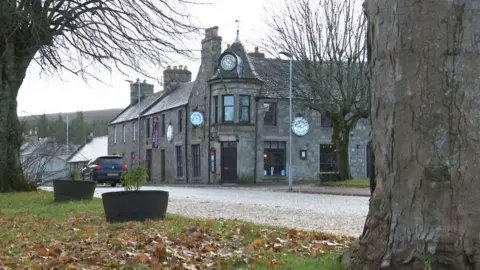
He established the Clockhouse restaurant, sinking hundreds of thousands of pounds into its renovation, took over a hotel and bought properties.
When he was arrested at his home in New Malden, Surrey, in 1994 and ultimately jailed for seven-and-half years, some locals feared it could lead to Tomintoul becoming a ghost town.
Dru McPherson, who now owns the Clockhouse restaurant, remembers when Williams first appeared in the village.
"You're going back now 35 years when he arrived in the village," he told BBC Scotland News.
"He was very low-profile, no airs and graces, just a businessman coming to the village to revitalise the businesses and properties."
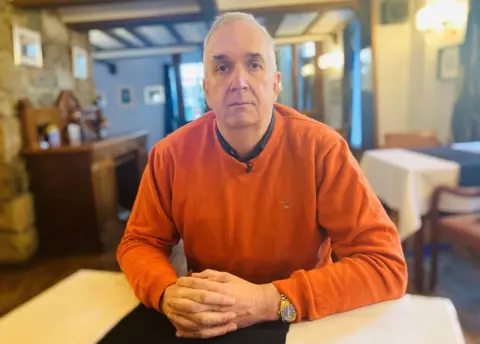
"He started here with the Clockhouse, which was formerly a village shop, and completely gutted the building from roof to basement," Mr McPherson added.
"This was a £1m project. The outer walls are fixed on to a frame of girders that hold the whole building in place and will do so for the next 200 years.
"At the time I remember thinking well why is anyone pumping these amounts of cash into Tomintoul? But these investors come into villages like this and without them you kind of wonder what would be left."
Mr McPherson said nobody in the village had any idea of Williams' wrongdoing.
"We only actually realised when policemen turned up with funny hats in the village because the Metropolitan Police wear their distinctive uniforms. They swooped in.
"Obviously shock and surprise was the initial reaction. In hindsight you look back and go 'yeah we should have figured this'. Interesting times back then."
The Clockhouse owner said that while he "obviously cannot condone theft or wrongdoing of any kind", he believes the investment had a positive outcome.
"Because although subsequently proven Tony Williams was a crook, he spent it in Tomintoul and my point is had he not done that then the properties and businesses you see today simply would not exist," he said. "They would be piles of rubble.
"So his intervention has lasted 30 years, employing people, keeping the village sustainable."
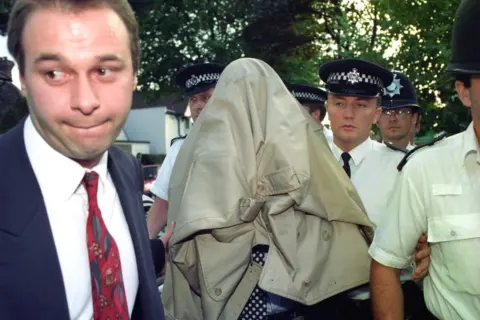 PA Archive
PA ArchiveMr McPherson explained: "I get he has done something wrong. If you give a kid keys to a sweetshop. It's an ethical question versus an opportunity. There is no doubt he committed a crime.
"I am not saying you need criminals but you need random investment."
Asked what he would say to him now, Mr McPherson said: "You have done a power of good in this area, rightly or wrongly.
"The buildings and jobs would not exist so, for that, well done."

Mona Grant, 86, is among local residents who also still recall Williams' arrival and impact.
"I just remember him coming to the village, and he looked a very smart man," she told BBC Scotland News.
"He did quite a lot in the village actually. I mean, stolen money, but he did up a few of the hotels and stuff. I suppose he did some good.
"I just knew him to say hello to. I think a lot of us thought he was alright you know, he was quite pleasant."
She said she was "a bit devastated" at the time after his crimes emerged.
Ebeth Coutts said: "Most of the properties he did acquire were improved, it was just unfortunate the way he went about it."
Duncan McGregor, 74, said: "It did do good for Tomintoul, there's no doubt about that, but it was stolen money at the end of the day."
Meanwhile, June Ferguson, 79, said: "He made a wonderful job with other people's money," but she added: "We could all do that."
Another local woman, who did not want to be identified, said: "I spoke to him once but he just turned away, and that told me all I needed to know."
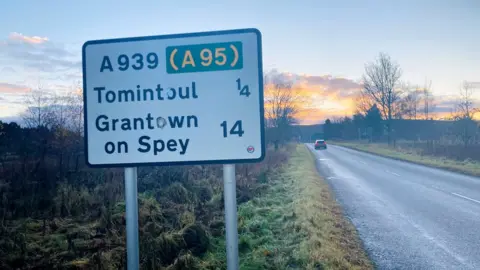
Following Williams' conviction, Sir Paul Condon, who was then the Met Police commissioner, offered an "unreserved apology" to the people of London for the abuse of their funds.
While he was "angry and embarrassed that the courageous work of police officers has been betrayed", Sir Paul was confident that it was a unique case that would never be repeated.
The scandal was even investigated by the UK parliament's public accounts committee, which criticised The Met for not discovering Williams' crimes sooner and for not having safeguards in place.
Robert Sheldon, the MP who chaired the committee, said Williams had been "living the life of a lord in Scotland".
He added: "We felt it astonishing that a senior civil servant could have been living such a life in Scotland, buying hotels and becoming an important figure in his local town - but coming to London to ensure that the sums of money were available.
"Mr Williams got away with that astonishing life. There was no investigation, and I find it strange that no one was aware of his lifestyle."
Williams would now be 83 but BBC Scotland News has been unable to establish whether he is still alive.
Thirty years on, his story may have faded from the wider collective memory.
But what does remain is what some clearly see as a positive long-lasting impact in the village.

Watch now on BBC iPlayer: David Wilson's Crime Files - Scams and Scandals: White Collar

